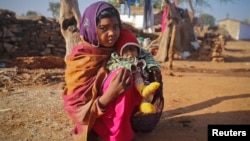India must campaign on social media, rewrite text books and engage its young men if it is to tackle child marriage in a country where nearly half of females wed before the legal age, according to a report released on Friday.
Despite a law banning girls from marrying before they turn 18, the practice is deeply rooted in tradition and widely accepted in society. Yet it is rarely reported as a crime and officials are often reluctant to prosecute offenders.
As a result, India ranks among countries with the highest rates of child marriage in the world, accounting for a third of the global total of more than 700 million women, according to UNICEF, the United Nations children's agency.
"Despite the policy attention given to child marriage, implementation has remained ineffective in curbing the root causes, and failed to produce a substantial impact on its eradication," charity ActionAid India said in its report.
"Legal efforts have failed to break the stranglehold of tradition and culture that continues to support child marriage."
While boys also marry in childhood, girls are disproportionately affected.
Early marriage makes it more likely that girls will drop out of school, and campaigners say it also increases the risks of exploitation, sexual violence, domestic abuse and death in childbirth.
While poverty and low levels of female literacy are often blamed for child marriage, the practice is prevalent even in wealthy households.
A report released last month showed nearly one in four girls in rural areas and one in five in urban areas married early, challenging a long-held assumption that child marriage is largely a rural phenomenon.
This is why the government must be more innovative in getting the message out, using social media and school text books, and starting from a young age, ActionAid said.
Boys and men must also be actively engaged, and religious and cultural institutions brought on board, too.
Government school teachers should be given legal authority to rescue children at risk of child marriage, it said.
Some recent efforts have helped, including a cash incentive, where the state transfers a lump sum to the girl's bank account if she remains in school and unwed at age 18.
Community efforts have also succeeded: suppliers of wedding tents in Rajasthan state have stopped dozens of child marriages by alerting officials.





